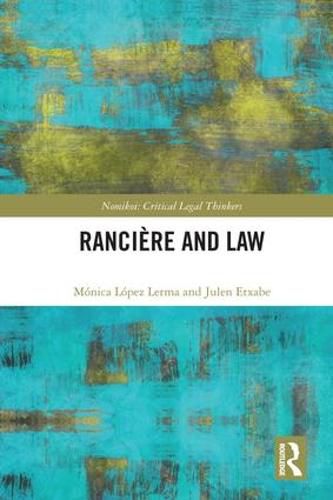Readings Newsletter
Become a Readings Member to make your shopping experience even easier.
Sign in or sign up for free!
You’re not far away from qualifying for FREE standard shipping within Australia
You’ve qualified for FREE standard shipping within Australia
The cart is loading…






This book is the first to approach Jacques Ranciere’s work from a legal perspective. A former student of Louis Althusser, Ranciere is one of the most important contemporary French philosophers of recent decades: offering an original and path-breaking way to think politics, democracy and aesthetics. Ranciere’s work has received wide and increasing critical attention, but no study exists so far that reflects on the wider implications of Ranciere for law and for socio-legal studies. Although Ranciere does not pay much specific attention to law-and there is a strong temptation to identify law with what he terms the police order -much of Ranciere’s historical work highlights the creative potential of law and legal language, with important legal implications and ramifications. So, rather than excavate the Rancierean corpus for isolated statements about the law, this volume reverses such a method and asks: what would a Ranciere-inspired legal theory look like? Bringing together specialists and scholars in different areas of law, critical theory and philosophy, this rethinking of law and socio-legal studies through Ranciere provides an original and important engagement with a range of contemporary legal topics, including constituent power and democracy, legal subjectivity, human rights, practices of adjudication, refugees, the nomos of modernity, and the sensory configurations of law. It will, then, be of considerable interest to those working in these areas.
$9.00 standard shipping within Australia
FREE standard shipping within Australia for orders over $100.00
Express & International shipping calculated at checkout
This book is the first to approach Jacques Ranciere’s work from a legal perspective. A former student of Louis Althusser, Ranciere is one of the most important contemporary French philosophers of recent decades: offering an original and path-breaking way to think politics, democracy and aesthetics. Ranciere’s work has received wide and increasing critical attention, but no study exists so far that reflects on the wider implications of Ranciere for law and for socio-legal studies. Although Ranciere does not pay much specific attention to law-and there is a strong temptation to identify law with what he terms the police order -much of Ranciere’s historical work highlights the creative potential of law and legal language, with important legal implications and ramifications. So, rather than excavate the Rancierean corpus for isolated statements about the law, this volume reverses such a method and asks: what would a Ranciere-inspired legal theory look like? Bringing together specialists and scholars in different areas of law, critical theory and philosophy, this rethinking of law and socio-legal studies through Ranciere provides an original and important engagement with a range of contemporary legal topics, including constituent power and democracy, legal subjectivity, human rights, practices of adjudication, refugees, the nomos of modernity, and the sensory configurations of law. It will, then, be of considerable interest to those working in these areas.